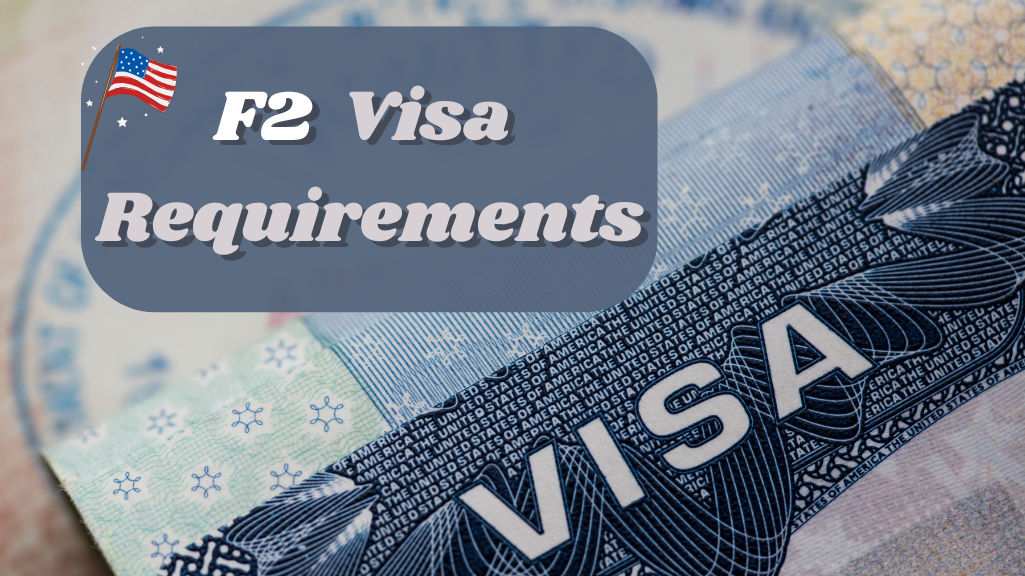Hey, if you’re an F-1 student planning to bring your family with you to the U.S., the F-2 visa is designed for your spouse and kids. It allows them to stay by your side while you complete your studies in the U.S.
In this article, we’ll cover every aspect of the F-2 visa—eligibility, financial requirements, documents, the application process, interview prep, life restrictions, and so on.
What Is the F-2 Visa?
The F-2 visa is classified as a “dependent visa” for immediate family members (spouse and children) of F-1 student visa holders. Unlike some other dependent visas, the F-2 visa has specific restrictions on work and study, which means it's a non-employment, limited-study visa for dependents. The main purpose is to keep families together while one member pursues education.
- Primary Purpose: Support F-1 students by allowing their families to accompany them.
- Restrictions: F-2 holders cannot work and have limited access to full-time education.
Who Qualifies? Only spouses and unmarried children under the age of 21 can apply. It’s important to note that once children turn 21 or get married, they are no longer eligible for F-2 status and will need a new visa type if they plan to stay in the U.S.

Key Eligibility Criteria
To qualify for the F-2 visa, certain conditions must be met:
- Relationship to the F-1 Visa Holder:
- Spouse: Must be legally married to the F-1 student. Domestic partnerships and common-law marriages are typically not eligible unless legally recognized in both the U.S. and your home country.
- Children: Unmarried children under 21 can accompany the F-1 parent on an F-2 visa.
- Financial Capacity:
- The F-1 student must demonstrate adequate financial resources to support the F-2 dependents throughout their stay.
- Amount Requirements: Each school has specific financial requirements, but most recommend an additional $10,000–$15,000 per dependent to cover housing, food, health insurance, and other living expenses.
- Maintaining the F-1 Status: The F-2 visa is contingent on the F-1 visa holder’s status. If the F-1 student completes their studies, withdraws from their program, or falls out of status, the F-2 visa is no longer valid.

Check: Complete F1 Visa Guide for Studying in the USA
Financial Requirements
To qualify for the F-2, you’ll need to demonstrate that you can financially support yourself and your dependents. F-2 visa holders cannot work, so the funds required must be enough to cover the entire period without employment income.
Here’s a breakdown of common financial requirements:
- Bank Statements: Provide at least three to six months’ worth of statements showing enough liquid assets.
- Proof of Income or Sponsorship: If a family member or sponsor (such as a relative) is supporting you, include their income proofs, affidavits of support, and bank details.
- Assistantships or Scholarships: If the F-1 student has a scholarship or assistantship that includes a stipend, include the official letters or contracts showing this financial support.

Required Documents for the F-2 Visa Application
To apply for an F-2 visa, you’ll need several documents to prove eligibility, family relationship, and financial capacity. Here’s the ultimate checklist:
- Passports: Each applicant, including spouses and children, must have a valid passport with at least six months of validity left beyond their intended stay in the U.S. For example, if you plan to stay until December 2025, your passport should be valid at least until June 2026.
- Form DS-160: The DS-160 is the online form that every U.S. visa applicant must complete. This form gathers essential information about the applicant’s travel plans, background, and purpose of visit. It’s crucial to fill out each field accurately since errors or inconsistencies could delay your application.
- Visa Fee Receipt: The F-2 visa application comes with a non-refundable application fee of $185. Make sure to pay this fee at an approved bank or online according to the instructions given by the U.S. Embassy or Consulate in your home country.
- I-20 Form for Each Dependent: For each dependent (spouse and/or children) applying for the F-2 visa, the F-1 student’s school must issue a separate Form I-20. This form, known as the "Certificate of Eligibility for Nonimmigrant Student Status," proves the dependent's intent to join the F-1 student and highlights the financial support they will have.
- Financial Documentation: Financial documentation is vital to prove that the F-1 student can support their dependents without relying on U.S. employment. Include recent bank statements (from the past three months) showing adequate funds to cover living expenses.
- Marriage and Birth Certificates:
- For spouses: The primary document for spouses is the marriage certificate, which should be issued by an official government authority. To further support the marriage, include wedding photos, travel photos, joint leases, or joint bank statements.
- For children: For each dependent child under 21, provide a birth certificate as primary proof of relationship to the F-1 visa holder. If the child is adopted, include adoption papers instead. These documents help prove the family connection, ensuring that each dependent is eligible to join the F-1 visa holder in the U.S.
- Interview Appointment Confirmation: After completing the DS-160 and paying the application fee, schedule an interview appointment with a U.S. Embassy or Consulate. Upon booking, you’ll receive a confirmation page with your appointment details.
Between 1997 and 2018, the number of F-2 visas issued annually varied, with a peak of 33,632 in 2015 and a low of 18,061 in 2005. The ratio of F-2 to F-1 visas has generally ranged between 5% and 9% during this period. Wikipedia

Detailed Application Process for the F-2 Visa
The application process for the F-2 visa involves multiple steps and careful attention to documentation. Here’s the step-by-step guide:
Step 1: Obtain the I-20 Form for Dependents:
- The F-1 student should inform their institution’s international student office of their intention to bring dependents.
- The institution will then issue separate I-20 forms for each dependent, which must be signed by both the F-1 student and their dependents.
Step 2: Complete the DS-160 Online Application:
- Each F-2 applicant must fill out Form DS-160, the standard nonimmigrant visa application form. This form asks for personal information, background, and purpose of travel.
Step 3: Pay the Visa Application Fee:
- Each dependent must pay a non-refundable visa fee of $185 before booking their appointment.
Step 4: Schedule an Interview:
- Book an interview at the U.S. Embassy or Consulate in your country. Wait times vary, so plan ahead, especially during peak seasons.
Step 5: Gather Documents:
- Ensure you have all the required documents (listed above) organized in a file. Missing paperwork can lead to delays.
Step 6: Attend the Interview:
- Each F-2 applicant must attend a visa interview unless they are too young (often under 14, depending on consulate policies).
See also: What Should You Do After Accepting Your Visa?
Preparing for the F-2 Visa Interview
For many applicants, the visa interview is the most nerve-wracking part of the application process. Here’s how to approach it with confidence:
- Dress Professionally: A good first impression matters, so dress neatly.
- Expect Relationship Questions: Consular officers want to ensure that applicants are genuinely related to the F-1 holder. If you’re a spouse, be prepared to discuss details about your marriage, how you met, and mutual future plans.
- Explain Financial Plans: Expect questions about financial support and living expenses. Bring clear proof of funds to show you can cover your stay.
- Be Honest: Honesty is critical; any inconsistencies can lead to complications.

Rules and Restrictions for an F-2 Dependent
While the F-2 visa allows dependents to live in the U.S. with the F-1 holder, there are strict limitations on employment and study.
- Employment Restrictions:
- F-2 visa holders cannot engage in paid work or freelance. Even remote work is prohibited unless it’s for a company based outside the U.S. where the income is non-U.S.-based.
- Education Options for Spouses and Children:
- Spouses: Limited to recreational or part-time classes, such as arts or language courses.
- Children: Unmarried F-2 children can enroll in K-12 schools. Once they reach age 21, they’ll need a new visa if they want to stay.
- Volunteer Opportunities:
- F-2 holders can volunteer for roles that don’t replace paid positions. For instance, volunteering at a nonprofit organization like a food bank is allowed.
Check Out: What Documents Do You Need For US Visa Processing?
Extending or Changing F-2 Status
If the F-1 student extends their study program or visa, F-2 dependents can request an extension by filing Form I-539 with the USCIS. You’ll need to update your financial documentation and provide proof that the F-1 holder has an extended stay.
Changing status from F-2 to another visa category (like F-1 for studying full-time or H-1B for employment) is possible but requires a separate application. F-2 dependents must exit the U.S. if the F-1 holder’s status is terminated, unless they’ve obtained their own visa status.
FAQs
1. Can F-2 visa holders work in the United States?
No, F-2 visa holders are not permitted to work in the U.S., either paid or unpaid, as their visa status strictly prohibits employment. Engaging in any kind of employment or freelance work can put their visa status at risk.
2. Can F-2 visa holders study in the U.S.?
- Spouses: F-2 spouses are restricted to part-time, non-degree courses, such as language or recreational classes, unless they apply for an F-1 visa to study full-time in a degree program.
- Children: F-2 dependent children under the age of 21 are allowed to attend elementary and secondary schools (K-12) on a full-time basis without needing a separate visa.
3. Can F-2 visa holders switch to an F-1 visa if they want to study full-time?
Yes, F-2 dependents who want to pursue a full-time academic program at a U.S. institution can apply for an F-1 visa by filing a change of status with USCIS or by leaving the U.S. and re-entering with an F-1 visa after the change is approved. This allows them to study full-time and take advantage of F-1 visa benefits, such as work authorization through CPT or OPT.
4. What happens to the F-2 visa if the F-1 visa holder’s status changes or they leave the U.S.?
The F-2 visa is dependent on the F-1 holder's status. If the F-1 student graduates, withdraws, or loses their visa status, the F-2 visa also becomes invalid, and the F-2 holders will need to leave the U.S. However, F-2 dependents can apply to change their visa status to another type (like F-1 or H-1B) if they meet the eligibility requirements for those visas.
5. How can an F-2 dependent apply for a driver’s license in the U.S.?
F-2 dependents can apply for a U.S. driver’s license at their local Department of Motor Vehicles (DMV). Requirements vary by state but typically include presenting a valid foreign license, I-20 form, passport, visa, and proof of residence in the state. Some states may require F-2 dependents to take a written or road test.
6. Are F-2 dependents required to have health insurance?
While health insurance is not a visa requirement, it’s highly recommended since medical expenses in the U.S. can be significant. Many universities offer health insurance plans that cover dependents, or F-1 holders can look for separate family health insurance plans to cover F-2 dependents.
7. Can F-2 visa holders volunteer in the U.S.?
Yes, F-2 visa holders are permitted to volunteer in unpaid positions as long as they do not displace U.S. workers or take roles that would typically be paid. Volunteering at non-profit organizations, schools, or local charities is generally allowed and can be a great way for F-2 spouses to engage with the community.
8. Do F-2 dependents need a Social Security Number (SSN) or an Individual Taxpayer Identification Number (ITIN)?
F-2 visa holders are generally not eligible for a Social Security Number (SSN) since they cannot work. However, if they need an ITIN (Individual Taxpayer Identification Number) for tax purposes—such as filing a tax return with their F-1 spouse—they can apply for one through the IRS.
9. Can F-2 dependents travel outside the U.S. and re-enter?
Yes, F-2 dependents can travel internationally and re-enter the U.S. as long as their F-2 visa is valid and the F-1 student remains in good standing. It’s essential to carry all necessary documents (like passports, valid visas, and updated I-20 forms) when re-entering the U.S.
10. How long can F-2 dependents stay in the U.S.?
F-2 dependents can stay in the U.S. as long as the F-1 visa holder is actively pursuing their studies. Once the F-1 student completes their program, the F-2 holders have a 60-day grace period to leave the U.S. unless they have changed their status or obtained a new visa.
11. Can F-2 children stay in the U.S. after they turn 21?
No, F-2 children lose their dependent status once they turn 21. They’ll need to switch to a different visa, such as an F-1 for students, to stay in the U.S. legally. Planning for this change well before they turn 21 is recommended to avoid any gaps in visa status.
12. Is it possible for F-2 dependents to extend their visa?
F-2 visas are tied to the F-1 student’s status. If the F-1 student extends their I-20 to allow more time for their studies, the F-2 visa’s validity can also be extended. F-2 dependents should file Form I-539 with USCIS for an extension and submit updated financial proof to support the extended stay.
13. Can F-2 visa holders switch to other visa types, like H-1B or J-1?
Yes, F-2 dependents can change their visa status to other types, like H-1B for employment or J-1 for exchange programs, if they qualify. They must submit an application to USCIS for a change of status or reapply from outside the U.S. as per the new visa type’s requirements.
14. Are F-2 visa holders allowed to open a bank account in the U.S.?
Yes, F-2 dependents can open a bank account in the U.S. Most banks require basic identification documents, including a passport, visa, and proof of residence. An SSN is not typically required, but banks may request an ITIN if the F-2 holder has one.
15. Can F-2 visa holders attend visa interviews without the F-1 holder?
Yes, F-2 applicants can attend visa interviews without the F-1 holder if the F-1 visa holder is already in the U.S. The F-2 applicant should carry all necessary documentation, including a copy of the F-1 holder's I-20, visa, and passport details.
